Infosys’ former Group HR head Nandita Gurjar on being a woman leader in corporate India
‘I was open-minded, worked hard and grabbed every opportunity that I saw - Nandita Gurjar.
Nandita Gurjar is an anomaly. She started her career after having her second child - most women drop out after their second child; she studied for an executive MBA diploma at Harvard Business School at the end of the career - most begin their careers with a shiny MBA degree, and in a world where women are said to be shy negotiators - she was one of the highest paid executives at Infosys in the 2012-13 fiscal.
She spoke to RJ Kavya on the first episode of IronLady Speaks – which offers lessons in leadership and life for working Indian women. You can listen to the radio show on Soundcloud. FM Rainbow 101.03, AIR Bengaluru, had first broadcast the show on its radio channel and is now, shared as an off broadcast recording of the live chat show.
This is the transcript of the entire show.
RJ Kavya: Research says working women in India make about 27 percent of the workforce in India. Why do you think that’s the case?
Nandita Gurjar: Let me start by being a little controversial. I think there are two reasons for it. One - women do not want to work; two - men do not want women to work.
And therefore, understandably, there is a very poor percentage of the women workforce in corporate, private sector and public sector. Let me expand that a bit. I think all of us know globally, that we blame men for it saying ‘you do not allow women into the workforce’. A lot of it is true. There is a lot of conditioning that goes into it. Right from, I think, caveman days, there were roles which were carved out.
They said that the men will go and hunt and work outside the home, and the women will work inside the home. Now, suddenly there are women saying, ‘I want to go outside and work’ and we are not telling the men that now you need to come inside the house and work. So, there’s a disconnect.
Suddenly, men feel threatened saying, ‘you are coming into my space’. I think that’s, of course, the 30,000-feet answer to it. But, really, when we track why women are opting out of the workforce, it is marriage, first child, and definitely after the second child. They just can’t cope with having a full-time 100 percent family life as well as a 100 percent career.
We are finding more and more women, where there is a good percentage of them at the entry level, they thin out dramatically at the senior management level. Once they drop out, they, unfortunately, don’t have the confidence to come back in.
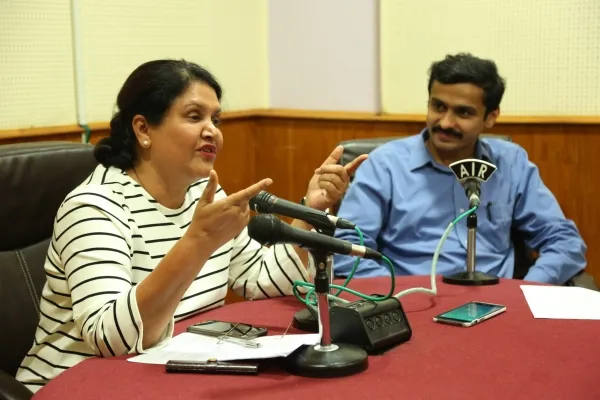
RJ: You started your career ten years post education. I want you to take us back to how you started. Did you really have a plan for your career or did you know what you wanted to do in life?
Nandita: Well, I got married after I completed the first year of masters. I completed my masters after my marriage, and had my first child three months later. That was the end of it with babyhood and stuff. Two years later, I had my second son. So, that completed my family...but, actually closed the hopes of going and starting work. The difference was that I never gave up on my vision or my dream of wanting to work. Did I know where I was going to work, what I was going to do, how I was going to grow in my career? Absolutely not!
I believe a lot of people, when they are younger, create plans and they say, ‘in two years I’m going to do this, in three years I’m going to do this, and then I’m going to get this title and this job designation, buy a house, buy a car and that’s how I’m going to go up the career ladder’.
However, for most of us, life has other plans. So, I think making those plans... sometimes gets in the way because then you won’t see opportunities when they come because you’re not open to them.
Whereas, for me, I was just looking for an opportunity to get out. Computers were just in, and I’m talking about 1995, or even earlier 1987, where computers were just coming in. And I said, let me go and do a two-year diploma in information technology from NIIT.
I did that and I applied for a job at Wipro. Unfortunately for them, I passed their technical test! And they said, ‘how come you passed the test when you’re not an engineer?’ And I said, ‘well I studied and that’s all it takes’.
So, I joined them as a consultant, and I did not get employee-ship since I was not an engineer. I worked with them as a consultant for nine months, and then they confirmed me. That’s how my career started as a software programmer without an engineering degree.

RJ: Based on your understanding and your career path, what are the top beliefs that people need to develop about themselves and others to reach the top?
Nandita: I like your question, especially the fact that what are 'your beliefs about others' that one need to have. That’s critical. Because let me talk about the beliefs you need to have about others.
I would say the first one is that you have to trust people. You have to believe that they come every day to work to do the best they can. You can’t be cynical, bitter and suspect people’s motives. I think that’s a very important part of your belief system.
The second one is that you have to support people. We are a huge human network which survives on the support of other people. It’s our duty to support other people because we cannot survive without one another.
Coming back to the beliefs we need to have as individuals, or ones which I used to have is - first is the belief in yourself. You have to believe that you are capable of doing things and you have to believe you’re the only shot you have. There is nobody else who is going to come from the skies and help you on it, you have to do your best.
The second one is you have to be able to give for you to get something in life. A lot of people miss out on that. People start negotiating, and saying, ‘when will I get this, or if you give me promotion, I will start working’. It doesn’t work that way. You first have to be able to add value and that’s when you get the returns.
The third one is that there is no one way to success. There are multiple ways. So, stop being a follower. Stop listening to what others believe is their journey, because if it doesn’t work for you, it doesn’t work for you. You have to have your own path. And that’s very important to do.
The last, but most important one, is work very hard. In your system, you really need to believe that hard work is what gets you there. It’s not just out of luck. Of course, there is the very famous quote which says, ‘The harder I work, the luckier I get’. That’s so true to everything we do. So, I think if you have these fundamental beliefs with you, it gives you the confidence to do it.
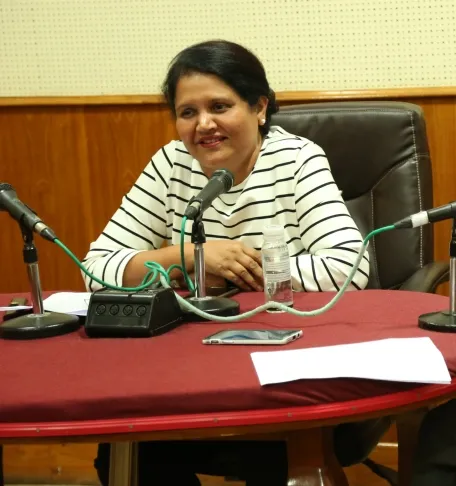
RJ: Did you stick to some values or guiding thoughts throughout your career right from the start? How do you actually think that people should develop these or stick to those?
Nandita: I think simply, you stay true to yourself. It’s easier said than done. First, you need to understand what is true to yourself, and what is something which is non-negotiable for you. You have to do a lot of introspection. You have to understand yourself and really, what is non-negotiable for you and you stick to that.
Two, you have to stick to your commitments. Your word has to mean something. You can’t be just promising things and not delivering on it because you lose credibility, you lose authenticity, and you don’t stand a chance in any job or career you take. And simple things. If, for example, you say you’re going to be on time, you have to be on time. I have not understood people’s disregard for other people’s time. You keep ten people waiting, that is ten people into ten minutes of time. So, it’s a lot of time.
I think discipline - of both yourself and expecting the same from other people - has to be a part of your value system.
Another important one is always look into details. As you grow more and more senior in your organisation, one has the tendency to miss that part, because you delegate your responsibility to your direct reports and they then delegate it to their direct reports and so on. So, it’s very critical for you to actually get into details because somebody submits some project, and gives some answers.
RJ: Did you have any tough situations in this context?
Nandita: Well, there are lots of them that actually test your belief system and your value system. It’s a part of life, and sometimes you have to question what you were standing up for... and sometimes you have to stay very strong onto your value systems. None of those are easy ones. There always is a price to pay, because value systems are not something that are easily doable. That’s why they are called value systems.
So, if you break it, then you have compromised on what you stood for. But, if you stick to it, you sometimes compromise on a lot of other things which you wanted from the organisation or your personal life. But, I have found from my personal experience that sticking to your own value system and belief always makes you look in the mirror with confidence, and with tremendous amount of faith, and I think that at the end of the day, is the most important thing.
RJ: How did you identify your own strengths, or do people need to identify their own strengths right in the beginning and focus on that? Can people actually do that right away in the beginning?
Nandita: I think those of us who introspect or know ourselves well would know what our strengths are, and would also know what our weaknesses are. It’s important to know both, not just our strengths, but also our weaknesses. How do we identify that - you find out what makes you excited.
For example, the minute you have to leverage on your strengths, there is a different kind of excitement which comes into our lives. You find it really easy to do, or you find yourself wanting to do those things. Then look for what you do differently. Do you approach something or do an action very different from others? Which means that that’s your strength. Do you volunteer and say, ‘I’ll do this part’? That’s something which is your strength. There is an ease with which you slip in. It doesn’t mean that it’s an easy thing to do, but for you it is something which is easier than for others. Those are the important ones.
People sometimes get lost in worrying about titles and job designations for strengths. When they have to say I have to grow as per my strengths, they are worried that they will be moving outside of the path of the typical linear ladder. On the contrary, if you follow your strengths, it becomes much easier for you to grow because you grow beautifully into the role which you can create for yourself.
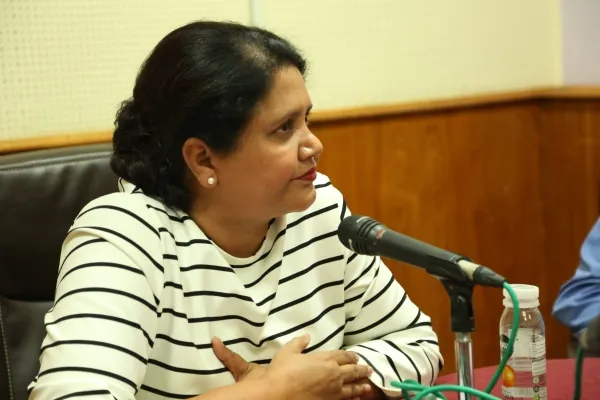
RJ: Would you say we should focus on our strengths rather than brooding on our weaknesses?
Nandita: Where your weaknesses are concerned, it is very important that you are aware of them, and that it’s not a blind spot - like you don’t know that it’s your weakness. Then you can get into trouble on that. But, if you are aware of your weaknesses, you have only that much time so you have to focus on improving your strengths...because strength is not something which you can leave without nourishment. So, you have to continuously work on your strengths. If you have to spend your time between working on your strengths and working on your weaknesses, I would say focus on your strengths.
RJ: Would you do that discreetly? Some people don’t like to expose their weaknesses; should one?
Nandita: I think people are smarter around you, and they would know your weakness anyway. So, whether you hide it, or say it, they would know it. I think it’s important to admit it rather than be proud of it. It’s that example of the child who was getting 80 in math and 50 in Hindi, and typical parents would say stop looking at math, and focus only on Hindi. So, maximum, he can go from 50 to 60 in Hindi, but his math drops to 70. It’s critical, therefore, to focus on your strengths rather than just your weakness.
RJ: Habits is something we are made of. What are the key daily habits that you developed?
Nandita: I think the first one would be, read. I love reading... and I think it’s very important for us to continue to read... especially as you get busier and busier, reading takes a back seat. But, that can be a wrong thing to do. Because you must get some of your ‘me time’ to get into a world which is different from the one you have... and books have a very beautiful way of taking you to a different space. You read things which are connected with your work, things which are fiction, non-fiction, anything that you enjoy reading.
The second thing I would say is exercise. I think it’s critical, and so underrated. I think youngsters are more conscious of this today, than we used to be. Exercise is critical because it gets oxygen into your brain, you can have stamina for a longer day, and of course it makes you feel good about yourself. You can de-stress in a wonderful way through exercise. I think that would be critical.
Then, of course is not making your work your life...because there’s so much more to life. It can’t be that that’s why I exist. It can define a portion of your life, but it cannot define who you are because at some point, you will be leaving your job and then, what do you become?
They don’t focus on their hobbies, their family, their relationships... and suddenly there is an entire part of the world that has gone away from them... because people are not going to wait. You are just left with this - go to work and come back late, and go to sleep and come back again the next day - and you become a robot.
So, it’s important to say, how am I spending my life? How am I spending my week? And make time for very different things to do.
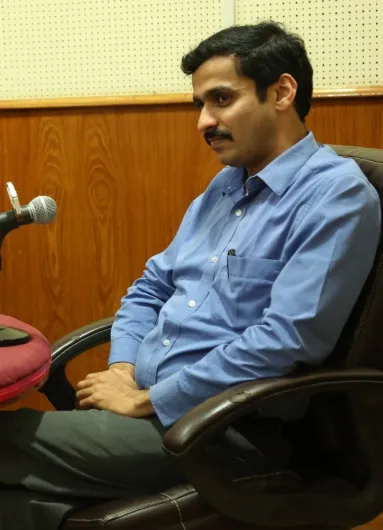
RJ: Did you attend any top MBA schools or such to develop the strategy to reach where you are today?
Nandita: Well, actually I attended an MBA school at the end of my career, rather than the beginning. So, no, I did not come with an MBA degree to say I have all the answers and all the strategies to lead a corporate life.
On the contrary, I was open-minded and worked hard and grabbed every opportunity that I saw and rose up in my career. It was only at the end of my career, a couple of years ago, that I went to Harvard Business School to do my executive MBA.
It was a tremendous thing to actually finish a successful career and look at what they’re teaching you, and say yes this works and this doesn’t.
RJ: What are the key habits that can help in managing stressful situations? Certain dos and don’ts... I’m sure.
Nandita: I think one is what I touched on, exercise and meditate.
It’s very important for you to breathe when you get into stressful situations...and that comes automatically to you if you have been exercising and doing yoga. But, I think there is also something called a mindset which you need to develop when you’re dealing with stress. That doesn’t come easy, it takes years to develop.
One is to be objective about a situation. One has to realise that what was important few years back, is not important now. When you look at that you say, ‘why was I worrying and losing sleep and getting so stressed out by something so silly because right now it makes no sense to me’. When you get that kind of objectivism, you realise that the famous line, ‘this too shall pass’ - whether it’s success or failure, it all passes. Nothing is permanent so nothing leaves you permanent damage and it’s up to you to get your spirits up and manage the rest of your life.
Two is, don’t get into politics. Because politics de-energises you because it’s negative, it harms people and whatever harms other people, harms you. So, stay out of politics.
The third is to keep ego out of the door. Most conflict and stress comes because of your ego. Any ego is an artificial thing, use it to your benefit. Sometimes, ego can work in your favour. But, most of the time, it does not. It comes in the way of relationships and I think it’s very important, therefore, to plant that ego outside to manage the stress.
Of course, there are times when you go through very deep stress...and you really feel that this cannot get worse than this.
I think that what worked for me was to say that I have my family, they all love me, everybody’s safe, everybody’s healthy and frankly, at the end of the day that’s all that matters. If you get yourself anchored to the really important things in your life, I think you stay out of that kind of stress.
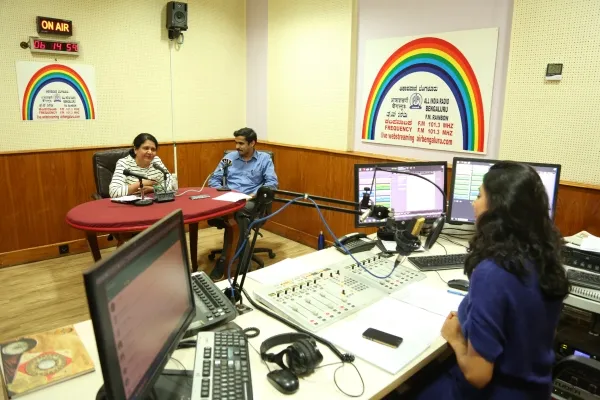
RJ: How much do you really sleep?
Nandita: I get very little sleep. But I’ve managed with 4-5 hours of sleep and I do fine.
RJ: Does music do anything to you at all?
Nandita: Absolutely. Destressing is... really because of music.
RJ: Research has shown that people need to stand up for themselves...especially if they need to grow in their career and be leaders. Women especially hesitate to stand up and women apply for a role only if they know they have 100 percent chances whereas men, they apply even if they have 60 percent.
Did you have to stand up for yourself all along the way ...and were you always given opportunities?
Nandita: This is actually real data. Something I’ve experienced in my life. Because, when I used to do the appraisals of the people who were reporting to me, I found the difference between the men and the women. The women would come in... and change some of the work they did, never overplayed their strengths. Whereas the men would come in confident, talk about things which they could not achieve, would give 100 excuses, and at the end of it, they felt they were winners.
Whereas women were apologetic.
They only focused on what they did not do and not on what they did. So, I used to always tell them that, ‘why are you only looking at what you didn’t do and focus on what you did which is as important as what you didn’t?’ Or at least get a balanced view of what you have done and what you haven’t.
In my case, I think I did the balance. It is very important to know what you could not do and understand why you could not... and also, focus on what you did and talk about it confidently and to be able to articulate the value which you created. I think that’s very important, because if you don’t do that then who else will?
RJ: How do you deal with politics?
Nandita: You can’t always walk away from politics because it exists. So, the faster you face it, the better it is.
But, you can always decide that you’re not going to be party to the politics which means you’re not going to add more fuel into the politics.
You’ve got to be level headed about it. You have to be honest and blunt about what you think of the situation, rather than play to who is winning in this game...and that’s why I need to support this person or because he’s senior.
In the long-term, it helps if you are true to yourself and people see that your views are objective rather than subjective.
RJ: Are the rules different for men and women?
Nandita: Not really. Office politics hits both.
RJ: Did you have to negotiate for your salaries, promotions and the roles that you took?
Nandita: Very few times, I had to do it. That was early in my career but when you reach the top, I, at least, didn’t have to negotiate because people are watching you...and they are smart people. (*smiles*)
RJ: Freedom is something we all cherish, but it also comes with a sort of responsibility. Though they begin to think freely, they are bound by guilt. Especially women, living behind kids or I can’t take care of the family as well as I could. How can we deal with that and what do you think of it?
Nandita: I think these are real problems.
One has to accept that, leaving children and going to work is one of the most painful parts of a woman’s life, and especially if they cry and say, “‘Mom don’t go”’, your heart just melts. It is very tough, and I faced a similar kind of thing leaving children at home. But, this is for a very short while.
Firstly, I believe children are creatures of routine. If you put them on a routine and say mom comes home at 5 or 6 pm, PM, they get used to it.
It’s very important also that you balance both your family and work. You can’t be just working and keeping long hours and not focusing on children and family because if you do that, then that guilt becomes real. So, the balancing part is very critical.
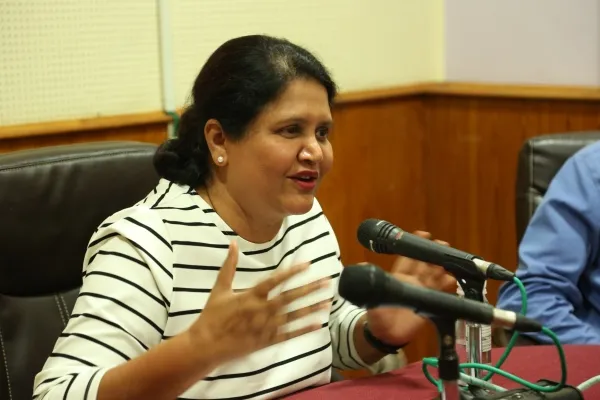
RJ: Was your family supportive?
Nandita: They were supportive, yes, in the usual supportive sense. If you’re going to work and as long as you manage everything, it’s great. But, it was like we will wait for you to come back and take over the kitchen and the help and the kids and their homework. So, I think some of the things where women fail is that when you have gone into the workspace and have started to get into the corporate life and started earning money and getting financially independent, it means that you have changed your role. It’s therefore also important for us to change the roles of the family members.
First and foremost, the husband, your larger support. It’s very important that you get him into looking after children, their homework, managing the kitchen, the shopping, everything.
Because if you don’t, and you start becoming a superwoman, then you fail at both the jobs. You have to allow them space and create a support system. Family in India, - we are blessed with that. Moms and moms-in-law. You have to accept that you need people to make this happen.
RJ: Do you really believe that women can have it all? In both personal and professional levels or lives.
Nandita: Women can have most of what they want. I don’t believe that men can have it all either. So, why should women even think that they should have it all? Both people do not have it all. I believe that both men and women face a glass ceiling.
There is finally only one CEO. So, people bounce back. It’s important for me to say this because a lot of women attribute the fact that they have not grown in their career as a gender issue. But, a lot of time, there is only one position at the top.
(Disclaimer: This is a content collaboration between Iron Lady Programs, HerStory Initiative and AIR FM Rainbow, Bengaluru. This is a three-part series. Rajesh Bhat is the founder, CEO of Magic Wand Empowerment and Iron Lady is run by Magic Wand Empowerment.)







